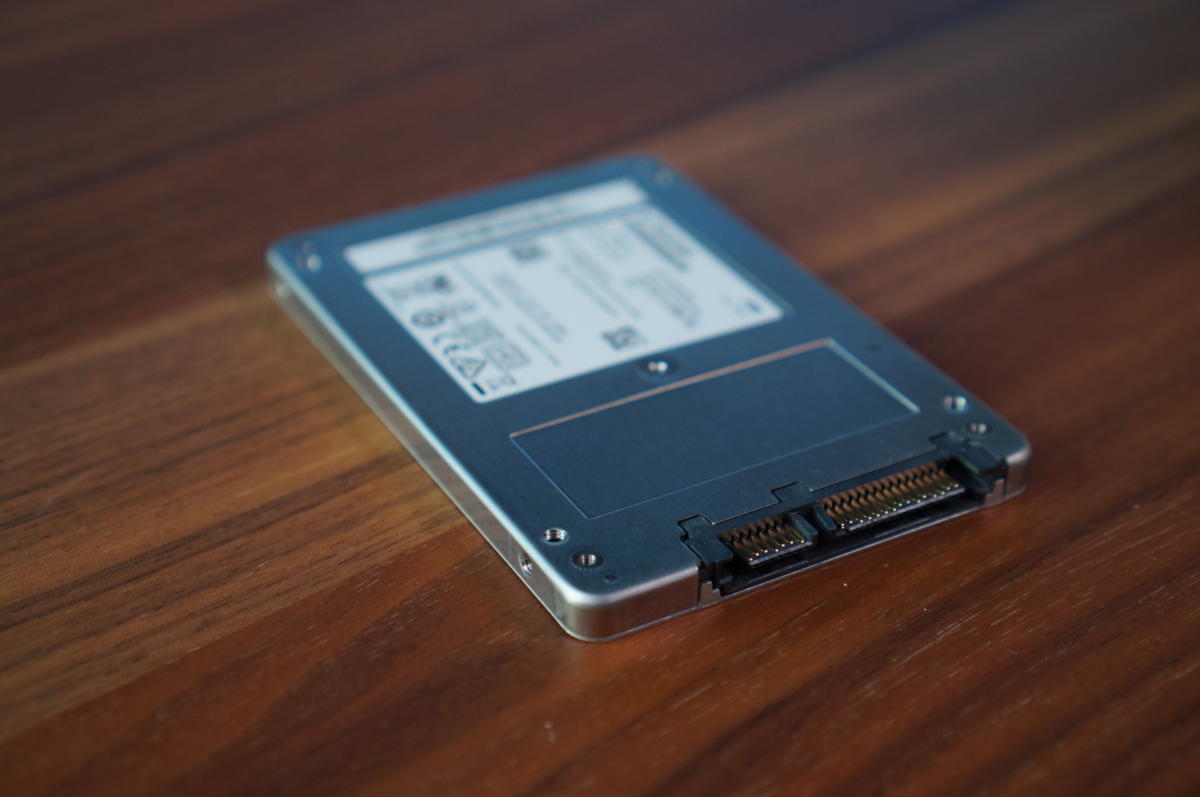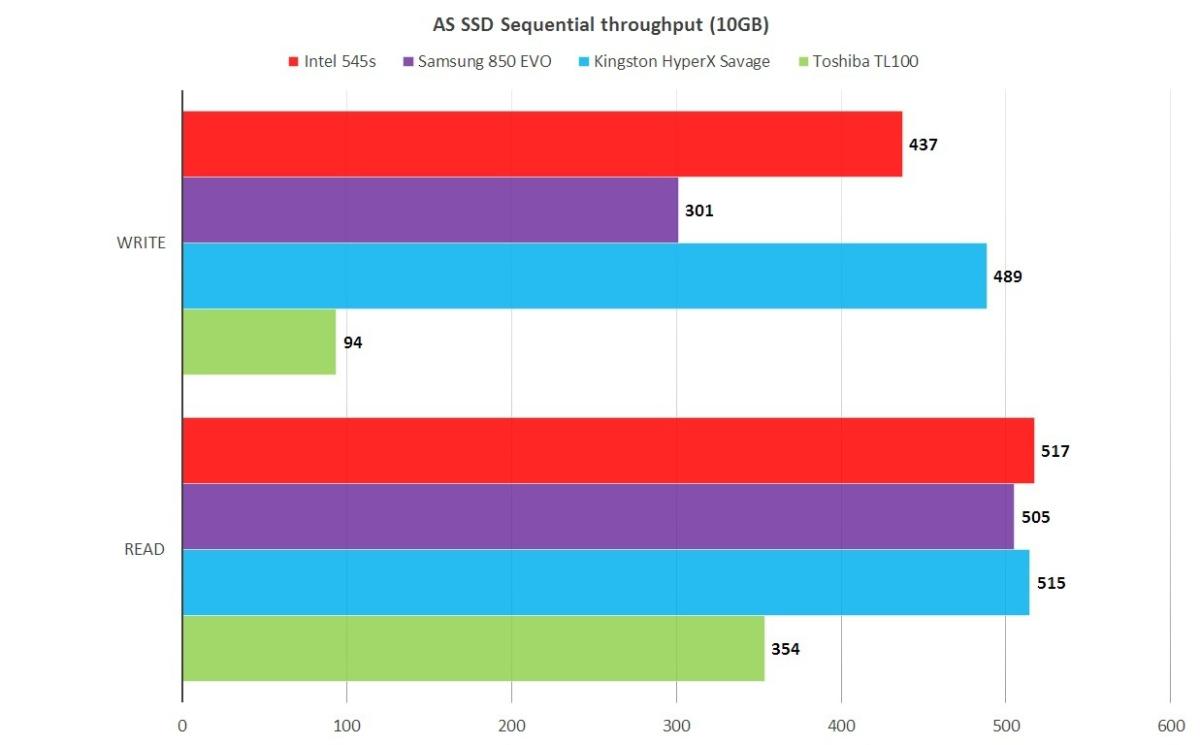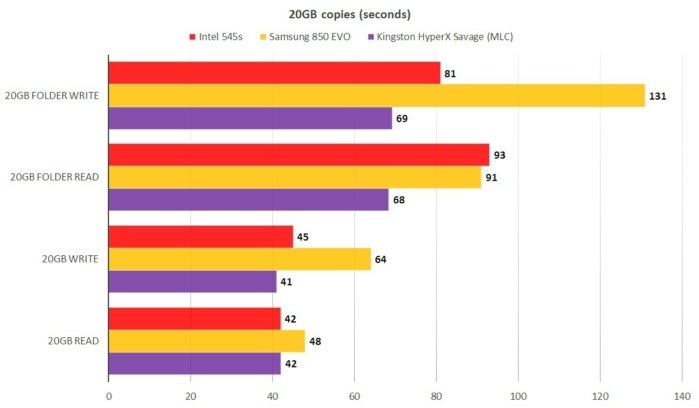Intel SSD 545s review - foutstognoo

At a Glance
Expert's Rating
Pros
- Very low-cost
- Doesn't largo down writing large data sets, as nigh TLC SSDs do
- Thin, attractive 7mm profile
- 5-year warrant and shrill write military rating
Cons
- Not quite as loyal overall as an MLC SSD
Our Verdict
Supplanting the Samsung EVO as the top dog in the low-end SSD market, the Intel 545S is the start buy TLC drive we've tested that won't invoke vendee's remorse the first time you have to write a peck of information to IT. IT's non as tight every bit an MLC drive, only shucks close. The 5-year guarantee and 288 TBW rating are senior perks as well.
Meet the next great budget SSD. Intel's 545s is an affordable yet reasonably speeding SSD that finally demotes Samsung's EVO from the top fleck in the consumer blank. At $180 for 512GB, the 545s offers all the mental ability and cost advantages of TLC NAND plus the uninterrupted write race of MLC NAND.
Note: This review is start out of our best SSDs roundup. Go there for details near competing products and how we tested them.
Design and spectacles
Our first coup d'oeil of the 545s with its raised edges had us thinking 'sardine tin' in a formal way: sleek and shiny. The drive's 7mm profile appears thinner thanks to the indented upper and lower surfaces.
Inside our run unit was a Silicon Motility SM2259 restrainer and 512GB of Intel's new 256-gigabit, 64-layer stacked (3D) uncommitted-gate typecast NAND. Maybe it's the gate that's responsible for the performance—Intel wasn't locution, and in fact the company didn''t play awake performance As very much like it played up the longevity and reliability behind the 5-class warranty. Most drives this cost are warrantied for only three days. The 288 TBW (TeraBytes Written) rating is also exceptional—the company apparently has a lot of faith in the controller and its NAND.
 IDG/Gordon Mah Ung
IDG/Gordon Mah Ung Don't turn up your nose at the SATA user interface fitting yet. IT's shut up the most favourite way people add storage to a PC.
Performance
We'll vex to the charts in a second, but the about telling part of the test experience was observation the Windows progress debar/throughput meter during our 20GB single file write test. Unlike with most TLC drives, speeds ne'er dropped, staying the course at an impressive 420MBps to 430MBps.
Of course, we diverted the notion that Intel had simply upped the amount of cache, so we tried copying 60GB. Same deal. Even if this is the result of a large or variable come of Tender loving care NAND being treated As MLC NAND, it still means few users would ever know a slowdown. Even full Blu-ray (not immoderate) movie rips weigh in at only 30GB, and a typical game on Steamer is less than that.
Hands-on, the 545s was the smoothest, virtually consistent performing artist we've seen in a while. The OS popped, all types of file operations were silky, and there were nary stutters when opening apps. The Samsung EVO is also smooth and consistent, but it drops to or so 300MBps writing when it runs out of TLC-as-MLC cache.
The EVO, unlike the 545s, does have its RAPID caching software package, which can importantly boost everyday carrying out past using system RAM equally hive up. We're non fans of memory board caching as it increases the risk of data loss attributable power outage, so we're only mentioning that to ward soured comments.
By the numbers, the 545s spanked the TLC competition, but Kingston's HyperX Savage and its MLC NAND led the way.
 IDG
IDG The Intel 545s blew away its Samsung 850 EVO rival and even came respectably around Kingston's HyperX Savage—an MLC drive.
Line that the Toshiba TL100 in the chart preceding is included to show just how dense TLC NAND can be.
 IDG
IDG Though it's not quite a match for the Kingston HyperX Savage and its MLC NAND, overall, the Intel 545s comes close and is far and away the fastest TLC SSD we've tested.
As you can go steady above, you're losing very little in performance, even to MLC drives, with the 545s, and at $180, IT's significantly cheaper than the competition. On Amazon the 480GB Kingston HyperX Savage currently sells for about $200, and the 500GB Samsung 850 EVO costs around $220.
In that location will eventually be 256GB, 1TB, and 2TB versions of the 545s, as fit as M.2 variants.
Conclusion
Intel's 545s is the number one TLC SSD we can recommend to consumers without shouting our standard caution—"Unless of course, you receive a similarly-priced MLC drive," which you quite often can. That warning is owed to TLC's slower sustained write speeds with enlarged data sets. We're not backing off entirely, but the 545s's public presentation comes close adequate to that of a high-velocity MLC drive, that we're just whispering information technology.
Otherwise, given its crack-low monetary value, outstanding warranty, and overall intellectual performance—it's pretty much the SATA SSD you should buy. And absolutely the TLC SATA SSD you should buy.
Source: https://www.pcworld.com/article/407063/intel-ssd-545s-review.html
Posted by: foutstognoo.blogspot.com


0 Response to "Intel SSD 545s review - foutstognoo"
Post a Comment